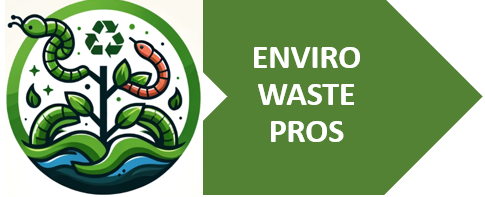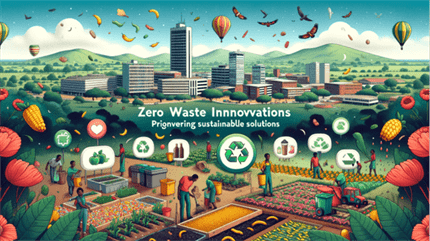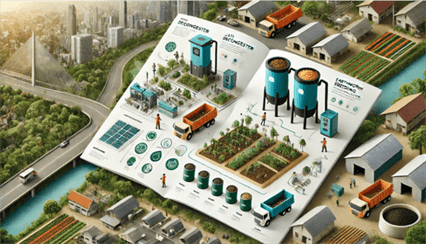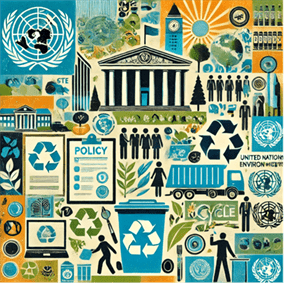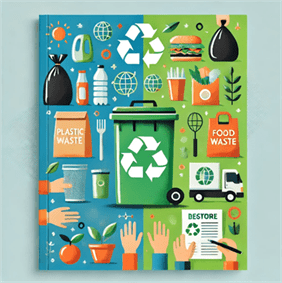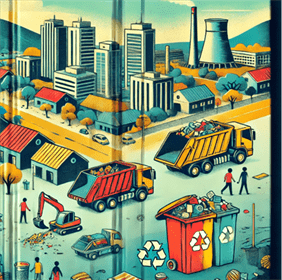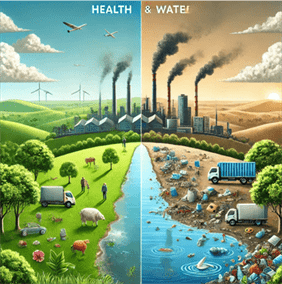Zero Waste Zimbabwe empowers communities with sustainable waste practices. Learn about the benefits and success stories.
Introduction to Zero Waste Initiatives in Zimbabwe
Zimbabwe, a country in Southern Africa, has been making significant strides towards implementing zero waste initiatives and promoting sustainable waste management practices. The concept of “Zero Waste Zimbabwe” has gained traction in recent years, with various stakeholders collaborating to create a cleaner, more sustainable future for the nation.
What is Zero Waste?
Zero waste is a comprehensive approach to waste management that aims to eliminate the production of waste rather than simply managing its disposal. This philosophy encourages the redesign of resource life cycles so that all products are reused, repaired, or recycled back into nature or the marketplace.
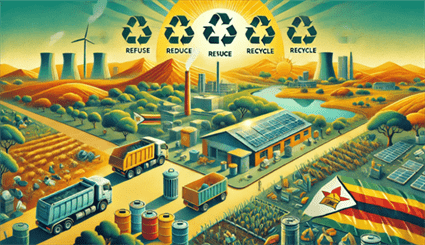
The Importance of Zero Waste for Zimbabwe
Implementing zero waste practices in Zimbabwe is crucial for several reasons:
- Environmental protection
- Resource conservation
- Economic opportunities
- Public health improvement
- Alignment with global sustainability goals
Key Players in Zimbabwe’s Zero Waste Movement
Government Agencies
- Environmental Management Agency (EMA): The EMA plays a pivotal role in promoting zero waste initiatives across Zimbabwe. They actively encourage citizens to pledge their contribution towards zero waste and showcase eco-innovations at events like the Zimbabwe International Trade Fair.
- Ministry of Environment, Climate, Tourism and Hospitality Industry: This ministry oversees the implementation of national environmental policies and coordinates efforts to achieve zero waste goals.
Non-Governmental Organizations
Several NGOs are working tirelessly to promote zero waste practices in Zimbabwe:
- Zero Waste International Alliance (ZWIA)
- Global Alliance on Incinerator Alternatives (GAIA)
- Local environmental groups
Private Sector
Numerous businesses in Zimbabwe have embraced the zero waste concept:
- Recycling companies (e.g., Petrecozim, Wasteaway Zimbabwe, Recycle Today)
- Corporations implementing zero waste programs (e.g., Delta Corporation, Econet Wireless)
- Enviro Waste Pros (Zim Earthworm Farms).
- With The Jati to Zero Waste Community Model by Zim Earthworm Farms (ZEF), Both Sewage and Solid Waste are Managed at Source, ie Processed, Treated, Recycled. and Valorized.
Zero Waste Initiatives in Zimbabwe
National Policies and Frameworks
Environmental Management Act
The Environmental Management Act (Chapter 20:27) provides a comprehensive framework for environmental protection and management in Zimbabwe, including waste reduction and recycling.
National Environmental Policy
This policy emphasizes waste minimization, recycling, and proper disposal, aiming to create a more circular economy in Zimbabwe.
Extended Producer Responsibility (EPR)
Zimbabwe is implementing EPR regulations to make manufacturers responsible for the entire lifecycle of their products, including disposal and recycling.
Urban Initiatives
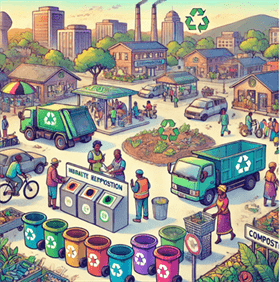
Harare’s Waste Management Strategy
| Component | Description |
|---|---|
| Waste Separation | Encourages separation of waste at source |
| Recycling Centers | Establishment of dedicated recycling facilities |
| Composting | Promotion of composting in residential areas |
| Pay-as-you-throw | Incentive system to reduce waste generation |
Bulawayo’s Green City Initiative
- Tree planting programs
- Urban agriculture promotion
- Solar-powered street lights
- Water conservation measures
Community-Based Programs
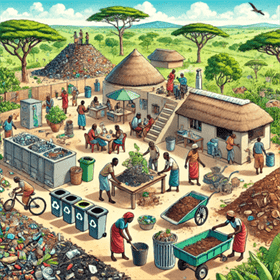
- Karoi Zero Waste Initiative: A pilot project that transformed a former garbage dump into a sustainable livelihood hub.
- Mashonaland West Zero-Waste Movement Chapter: Launched to position the province for sustainable economic development.
- Clean Cities Competition: Promotes clean environments across urban areas.
Educational Initiatives
- School programs on environmental education
- University research on sustainable waste management
- Community workshops and training sessions
Technologies Supporting Zero Waste in Zimbabwe
- Waste Sorting Technologies: Advanced sorting systems to improve recycling efficiency.
- Composting Technologies: Both industrial and household composting solutions.
- Waste-to-Energy Systems: Exploring possibilities for converting waste to usable energy.
- Digital Platforms: Apps and online tools for waste management education and coordination.
Economic Benefits of Zero Waste for Zimbabwe
Job Creation
The zero waste movement has led to the creation of numerous jobs in Zimbabwe:
- Recycling plant operators
- Waste collectors and sorters
- Environmental educators
- Green technology innovators
Business Opportunities
Local businesses are finding new opportunities in the zero waste sector:
- Manufacturing of eco-friendly products
- Recycling and upcycling businesses
- Waste management consulting services
Cost Savings for Municipalities
By reducing waste sent to landfills, municipalities can save on waste management costs and allocate resources to other essential services.
Challenges Facing Zero Waste Initiatives in Zimbabwe
Despite the progress, Zimbabwe faces several challenges in achieving its zero waste goals:
- Limited Infrastructure: Insufficient waste collection and recycling facilities, especially in rural areas.
- Public Awareness: Lack of comprehensive understanding about waste separation and recycling among the general population.
- Financial Constraints: Limited funding for large-scale waste management projects.
- Informal Waste Sector: The need to integrate informal waste pickers into formal waste management systems.
- Technological Gaps: Limited access to advanced waste management technologies.
Strategies to Overcome Zero Waste Challenges
To address these challenges, Zimbabwe is considering the following strategies:
- Infrastructure Development: Increasing investment in waste management facilities across the country.
- Public Education Campaigns: Launching comprehensive awareness programs to educate citizens about zero waste practices.
- Public-Private Partnerships: Collaborating with businesses to fund and implement zero waste projects.
- Policy Enhancements: Strengthening and enforcing waste management regulations.
- Technology Adoption: Investing in modern waste management technologies to improve efficiency.
Success Stories: Zero Waste Champions in Zimbabwe
Women-Led Initiatives
Women are playing a crucial role in tackling plastic waste in Zimbabwe. Many women-led groups are collecting plastic waste from dumpsites and communities, selling it to recycling companies. This not only contributes to environmental preservation but also provides economic empowerment.
Corporate Leaders
Several companies in Zimbabwe have taken significant steps towards zero waste:
- Zim Earthworm Farms: With The Jati to Zero Waste Community Model by Zim Earthworm Farms (ZEF), Both Sewage and Solid Waste are Managed at Source, ie Processed, Treated, Recycled. and Valorized. (Find details here)
- Delta Corporation: Implemented a successful bottle return system for its beverages.
- Econet Wireless: Runs an efficient e-waste collection and recycling program.
Community Heroes
Spotlight on individuals and community groups making a difference:
- The 17 volunteers in Karoi who transformed a garbage dump into a recycling hub.
- Local artists creating beautiful works from recycled materials.
The Future of Zero Waste in Zimbabwe
As Zimbabwe continues its journey towards zero waste, several key areas will likely see development:
- Circular Economy: Moving towards a more circular economic model where waste is minimized and resources are continually reused.
- Green Technology: Increased adoption of environmentally friendly technologies in waste management.
- Policy Evolution: Continued refinement of policies to support zero waste goals.
- International Collaboration: Strengthening partnerships with global zero waste organizations and initiatives.
How Individuals Can Contribute to Zero Waste Zimbabwe
Everyone has a role to play in achieving a zero waste Zimbabwe. Here are some ways individuals can contribute:
- Practice the 5 Rs: Refuse, Reduce, Reuse, Recycle, Rot (Compost)
- Participate in local recycling programs
- Support businesses that embrace zero waste practices
- Educate friends and family about the importance of waste reduction
- Engage with local government to support zero waste initiatives
Conclusion: The Path Forward for Zero Waste Zimbabwe
Zimbabwe’s journey towards zero waste is a testament to the country’s commitment to environmental sustainability and economic development. While challenges remain, the collaborative efforts of government agencies, private sector entities, NGOs, and citizens are driving significant progress.
As Zimbabwe continues to implement and refine its zero waste strategies, it is positioning itself as an emerging leader in sustainable waste management in Africa. The success of these initiatives will not only benefit the environment but also create economic opportunities and improve the quality of life for all Zimbabweans.
By embracing the principles of zero waste, Zimbabwe is taking important steps towards a cleaner, greener, and more prosperous future. As the movement gains momentum, it serves as an inspiration for other nations facing similar waste management challenges, demonstrating that with dedication, innovation, and collective effort, a zero waste future is within reach.
Related Articles:
Further Reading:
